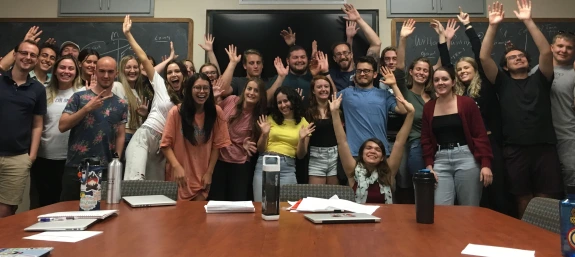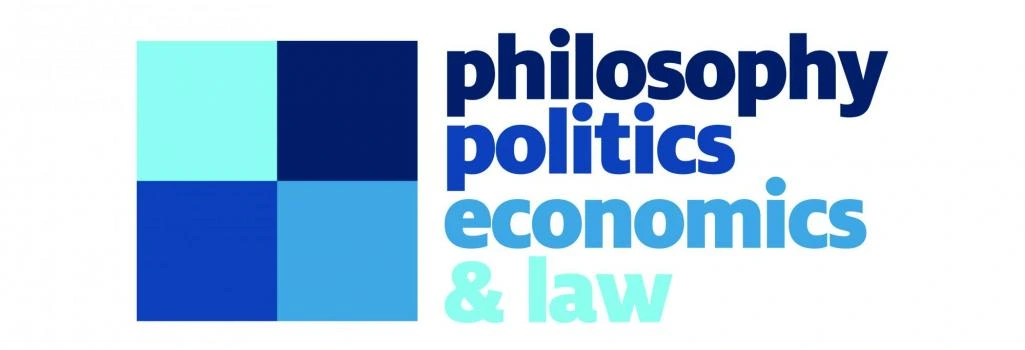
Bachelor of Arts
Philosophy, Politics, Economics & Law
Study intensively interdisciplinary topics in small classes to develop a comprehensive understanding of current social, economic, and political issues. Learn from faculty who are part of the #1 political philosophy program in the world!
About the Major

The Philosophy, Politics, Economics and Law (PPEL) degree is an interdisciplinary undergraduate major of the very highest quality giving you – within a major research university – an undergraduate experience of the sort typically identified with the most successful honors colleges or outstanding liberal arts institutions
The major aims to promote sustained philosophical reflection on the interrelations of political, legal, and economic activities and institutions. Although students learn the basic tools of economic analysis, the major is also grounded on the humanistic tradition, encouraging analytical and critical reflection on the fundamental values that shape, or should shape, the economic, political, and legal domains.
The PPEL major encourages deep understanding of the moral and historical foundations of economic institutions and political-legal structures. Graduates excel in logical thinking and complex conceptual analysis, skills that are increasingly important in public policy and business.
Within a large public state university, PPEL offers motivated students the opportunity to study with distinguished faculty in small classes. Because each year's class proceeds through the program together, as a group, PPEL students get to know each other and have sustained interaction with their cohorts. The July 23, 2015 New York Times reports that one of the few important differences in student learning among American universities is that "Students tend to learn more in colleges where they have closer relationships with faculty and peers...." That is what the PPEL major provides to University of Arizona students.
Program Learning Outcomes
Upon completion of the program, students will have mastered each Program Learning Outcome associated with the core courses. The Program Learning Outcomes are listed as follows:
Integration
Students will constructively apply concepts and arguments from the philosophical, political, economic and legal traditions to analyze social norms, institutions, and processes.
Formalization
Students will successfully apply formal methods, such as utility theory, game theory, social choice theory, or data science, to problems of moral and political life.
Collaboration
Students will collaborate effectively as a cohort in addressing both modern and historic philosophical discussions of issues of political economy.
Feasibility
Students will demonstrate knowledge of real-world implications of normative and explanatory models in political economy and cultivate expertise for their practical application.
Areas of Study
The major draws on established courses from philosophy, politics, and economics, but the heart of the program is a set of specialized core courses, designed for PPEL majors. These courses are taught by distinguished faculty with appointments in philosophy, political science, economics and law. In addition, the program allows students to pursue their own specialized interests by further study in one of the tracks.
History of PPEL
The study of philosophy, politics, and economics as a combined discipline originated at Oxford University in the first part of the twentieth century, although at Oxford it represented not so much an integration of the three fields as a curriculum that drew on all three. In recent years the number of undergraduate PPE degree programs has increased, and a journal is now devoted to the field.
From one view, we are witnessing the rise of a new discipline or perhaps the resurrection of the nineteenth century discipline of political economy. In 1821 James Mill, David Ricardo, Thomas Malthus, and Robert Torrens founded the London Political Economy Club. In 1825 the Drummand Chair of Political Economy was founded at Oxford, which required occupants, such as Nassau Senior, to give a series of lectures. The first economics department in Britain was funded at University College London; John Ramsey McCulloch occupied its first chair of political economy. In 1830 Jean-Baptiste Say occupied the first political economy professorship in France. (Thomas Jefferson wanted to offer Say the chair of political economy at the University of Virginia.) The high point of the discipline of political economy was from this period until the 1870s. The greatest economics text of the nineteenth century, written by John Stuart Mill, was entitled Principles of Political Economy, with Some of Their Applications to Social Philosophy (first edition 1848, last edition 1871).
PPE as political economy was then a well-defined field, with professional organizations, academic chairs, and textbooks. However, after the "marginalist revolution" led by Carl Menger, William Stanley Jevons, and Leon Walras, economics developed highly formalized, mathematical models of economic life. Jevons, and especially Walras, immediately saw how the idea of diminishing marginal utility allowed for the calculus to be applied to economics. After this, political science and economics (and social philosophy) went their separate ways, developing different professional organizations but, more important, different methods and tools. Some scholars believe we are currently witnessing a reintegration of these disciplines. From this first view, the study of economics and politics and, as Mill would say, their applications to social philosophy, cannot, in the end, be divorced.
At the University of Arizona, PPEL is part of an ongoing world-wide project of reintergrating these three key disciplines, with special attention to the relevance to law.
Careers
- Law. Many students entering PPEL are considering graduate work towards the J.D. degree. PPEL provides a truly excellent basis for a highly competitive law school application. The best law schools do not generally look for students who have already studied a lot of law (teaching law is what law schools do!), but for students with rigorous training in writing, analytic thinking and background in areas such as economics. In addition, because PPEL is a small major taught by experienced faculty who get to know students and their work really well, PPEL students are in a position to get excellent letters of recommendation from internationally-known faculty. However, an important word of warning: at the current time there is considerable debate within the legal profession about the employment prospects for those with the J.D. degree. PPEL strongly encourages students to carefully research the job market in law and explore their options. See for example, this article in The New York Times. Early commitment to a legal career may be inadvisable.
- Public Policy. PPEL is a truly excellent foundation for careers in public policy and entry to Masters in Public Policy programs. It provides students with a grasp of the basic tools and concepts of economics as they apply to politics. Students with public policy degrees can work in government, for private research institutions and non-profits.
- Business. The PPEL program is not a professional degree; however, throughout the United States students with "PPE" degrees have been very competitive for positions in business and finance.
- Graduate Study in Philosophy and Political Science. PPEL students are in a very good position to continue their studies via advanced work in Philosophy and Political Science.
- Economics. The PPEL program has led to students continuing to graduate degree programs in Economics.

